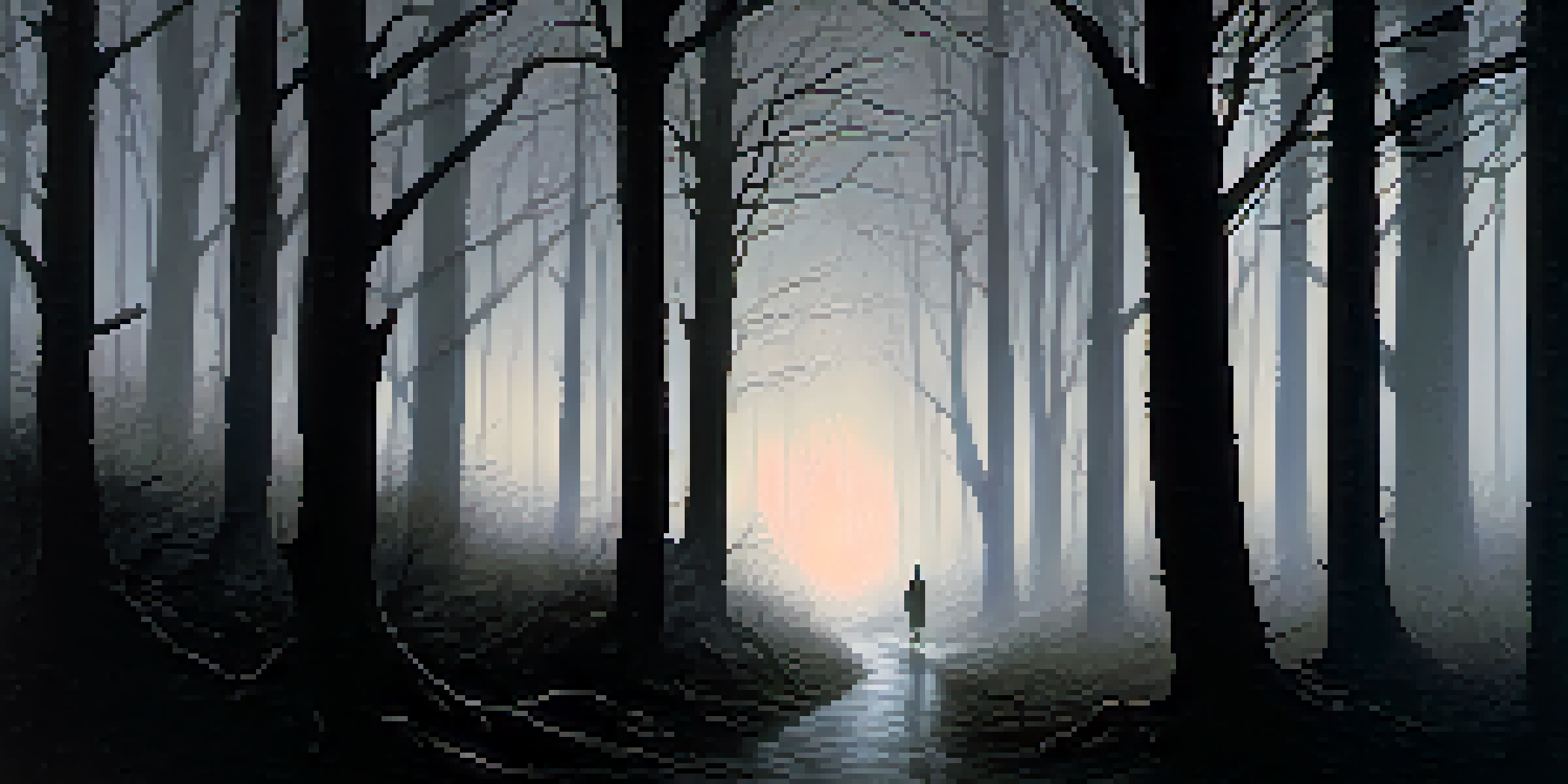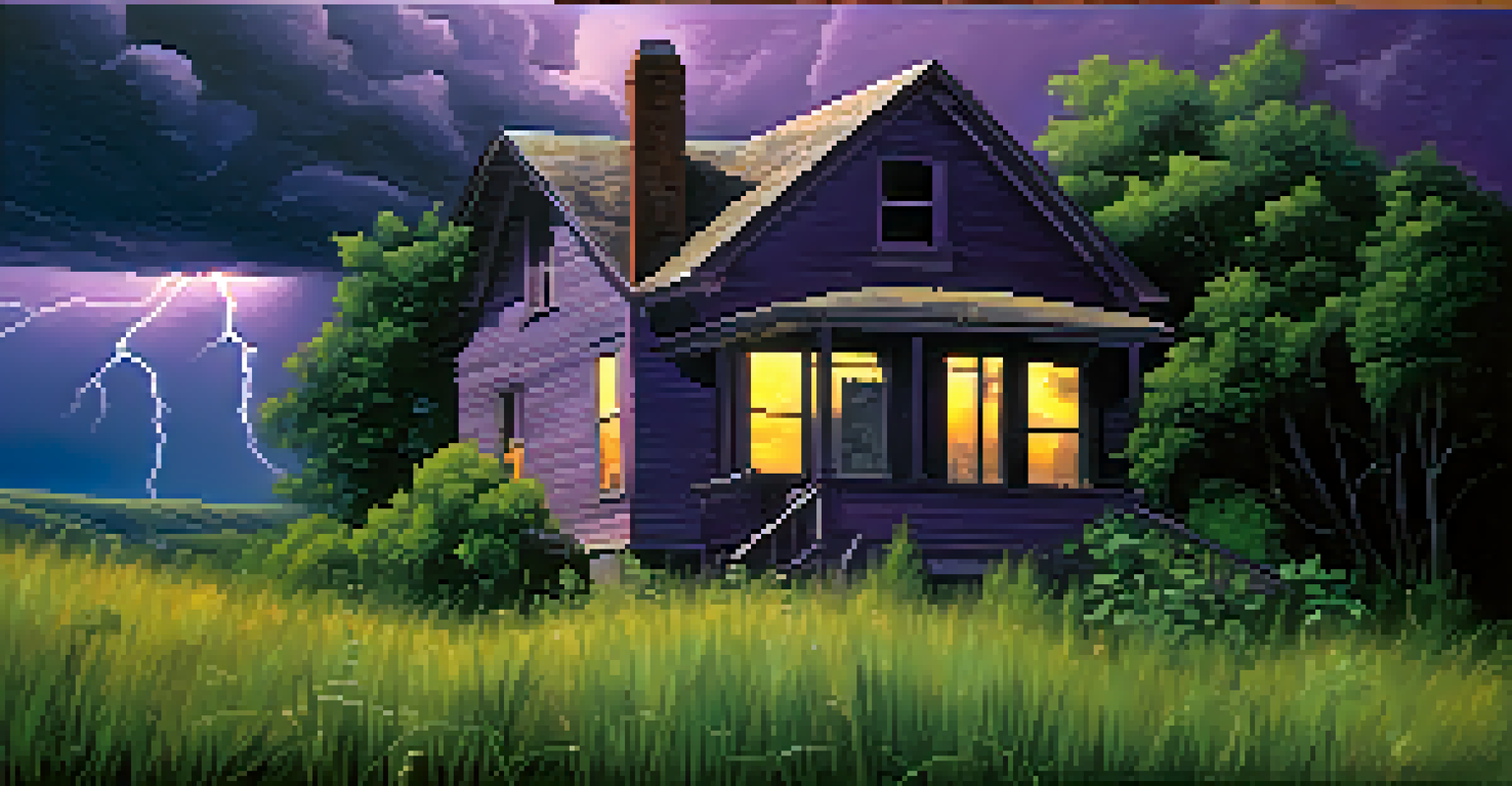The Psychology of Fear: How Horror Films Manipulate Emotions

What Makes Horror Films So Captivating?
Horror films have a unique ability to draw us in, offering an adrenaline rush that few other genres can. This thrill comes from our primal instinct to respond to danger, which makes the experience both exhilarating and terrifying. The suspenseful build-up and unexpected twists keep viewers on the edge of their seats, creating a blend of fear and excitement that's hard to resist.
The only thing we have to fear is fear itself.
Moreover, horror films often tap into universal fears, such as the fear of the dark or the unknown, making them relatable. These shared anxieties allow audiences to connect deeply with the characters and storylines. It's like a rollercoaster ride of emotions where you know you're safe, yet your body responds as if you're in real danger.
This captivating nature of horror films explains their lasting popularity, with audiences continually seeking that perfect scare. Whether it's through supernatural elements or psychological thrillers, horror films challenge our perceptions and push the boundaries of our comfort zones.
The Science Behind Fear: Why We Enjoy Being Scared
Understanding the psychology of fear reveals why we crave horror films. When we watch something frightening, our brain releases chemicals like adrenaline and dopamine, which heighten our senses and make us feel alive. This biological response can create a sense of euphoria, turning fear into a thrilling experience rather than a negative one.

Additionally, engaging with fear through films allows us to confront our anxieties in a controlled environment. It’s a safe space to explore emotions that we might typically avoid in real life. This cathartic experience can help us process feelings of fear and anxiety, making horror films a therapeutic outlet for some.
Horror Films Ignite Our Primal Fears
Horror films tap into universal fears, creating an exhilarating experience that keeps audiences coming back for more.
Interestingly, the enjoyment of fear varies from person to person. While some seek the adrenaline rush, others might prefer the psychological aspects of horror. This difference highlights the complexity of human emotions and how each individual relates to fear in their unique way.
How Horror Films Create Suspense and Tension
Suspense is a key ingredient in horror films, and filmmakers use various techniques to amplify this tension. For instance, the use of silence can create an unsettling atmosphere, making viewers anticipate the inevitable jump scare. This technique plays on our expectation and builds anxiety, much like waiting for a storm to hit.
There is no terror in the bang, only in the anticipation of it.
Another method is the strategic use of pacing and editing. Quick cuts and sudden shifts in music can heighten the intensity of a scene, keeping audiences on their toes. This manipulation of timing creates a rollercoaster effect that pulls viewers deeper into the narrative, making them feel every moment of fear.
Moreover, relatable characters can amplify suspense. When we empathize with the protagonist, we feel their fear more acutely. This connection makes the horror elements more impactful, as we worry about what might happen to them, thus enhancing our overall experience.
The Role of Sound and Music in Horror Films
Sound and music are powerful tools in creating an eerie ambiance in horror films. From haunting melodies to sudden, jarring noises, the auditory experience significantly shapes our emotional response. A well-timed musical cue can make our hearts race or send chills down our spine, deepening our immersion in the story.
For example, the infamous 'Jaws' score instantly evokes fear, signaling danger even before we see the threat. This use of sound primes our minds to react, tapping into our instinctual fears. It’s a clever way filmmakers manipulate our emotions, using sound as a sort of psychological trigger.
Psychological Benefits of Fear Exposure
Watching horror allows viewers to confront their anxieties in a controlled environment, offering a cathartic release.
Moreover, silence can be just as impactful as sound. In horror films, moments of silence build anticipation and create a sense of impending doom. This juxtaposition between loud and quiet moments keeps viewers engaged, making them more susceptible to the scares that follow.
Exploring the Impact of Horror Films on the Brain
Research shows that horror films can lead to a range of neurological responses, from increased heart rate to heightened alertness. When we watch something frightening, our brain processes these stimuli, activating the fight-or-flight response. This biological reaction can be thrilling, as it mimics real danger while remaining within a safe context.
Moreover, horror films can enhance our emotional intelligence by forcing us to confront our fears. This confrontation can lead to greater self-awareness and understanding of our emotional triggers. By exploring the darker aspects of human nature, horror films provide insights into our psyche that we may not encounter in everyday life.
Interestingly, this impact isn't just limited to the viewing experience. After watching horror films, viewers often engage in discussions about their fears and anxieties. This social aspect adds another layer to the horror experience, allowing fans to bond over shared emotions and interpretations of the film.
The Cultural Significance of Horror Films
Horror films often reflect societal fears and cultural anxieties, making them a fascinating lens through which to examine human behavior. For instance, during times of political unrest or social change, horror films frequently explore themes of isolation, distrust, or the breakdown of community. This mirror effect can resonate deeply with audiences, making the horror feel all the more real.
Additionally, horror films often serve as a commentary on contemporary issues, such as technology or environmental concerns. By exaggerating these fears through a horror lens, filmmakers provoke thought and discussion, encouraging viewers to reflect on their own beliefs and fears. This blend of entertainment and social critique enriches the genre's significance.
Cultural Reflections in Horror Movies
Horror films serve as a mirror to societal fears, often addressing contemporary issues and provoking important discussions.
Ultimately, horror films are more than just a means of entertainment; they can also be a vehicle for social change. By addressing uncomfortable truths and fears, they challenge us to confront and discuss issues that might otherwise remain in the shadows.
Conclusions: The Lasting Appeal of Horror Films
The psychology of fear reveals the intricate ways horror films manipulate our emotions, making them a fascinating genre for both viewers and creators. Our biological response to fear, combined with techniques like suspense, sound, and cultural reflection, creates a rich tapestry of engagement. This complexity explains why horror films continue to captivate audiences around the world.
Moreover, the cathartic experience of facing fears in a safe environment offers a unique psychological benefit. Whether it’s the adrenaline rush or the opportunity for self-reflection, horror films meet our emotional needs in diverse ways. They give us a chance to explore our fears while also providing a sense of community through shared experiences.

In the end, horror films remind us of our humanity, our vulnerabilities, and our resilience. As long as there are fears to explore, horror films will remain a beloved part of our cultural landscape.